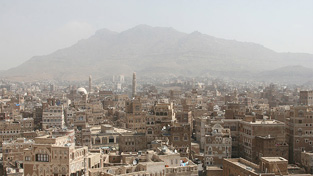The Other Approach
Of course, conferences are great and all, but- and I know we’ve forgotten this after eight years of diplomacy- there are also military options when it comes to combating terrorism. The big story today is the Postscoop about US/Yemeni operations to fight AQAP. Here is the money quote.
The operations, approved by President Obama and begun six weeks ago, involve several dozen troops from the U.S. military’s clandestine Joint Special Operations Command (JSOC), whose main mission is tracking and killing suspected terrorists. The American advisers do not take part in raids in Yemen, but help plan missions, develop tactics and provide weapons and munitions. Highly sensitive intelligence is being shared with the Yemeni forces, including electronic and video surveillance, as well as three-dimensional terrain maps and detailed analysis of the al-Qaeda network.
I suppose this is true in the very loosest definition of “not taking part in raids”. Giving the intelligence, providing the weapons, and planning the raids are all pretty important components. It is kind of like saying that all a football coach does is pick the players and draw up and call the plays. Yes, the actual execution comes down to personnel, but what the US government is doing (to jump away from metaphor) is being as involved as possible within the strict letter of non-involvement.
To be clear, I am not totally opposed to this. I don’t think that anyone in the world, much less in Yemen itself, would believe that the raids are being planned and executed entirely by Salih. No one is that naive. Even if we weren’t involved, people would believe that we are. So as long as that perception is there, our best bet is to maximize opportunity without going too far.
I guess I just don’t like this being bragged about to the Post. It helps internally, it is geared for domestic consumption, but there are serious pitfalls in making things explicit.
I think a really interesting part of the article is a “senior official” (my money is on Orzag) talking about the cooperation that Salih has shown even before Christmas, and that he was serious about getting rid of AQAP.
Saleh has faced pressure not only from the United States but also his country’s main financial backers, Saudi Arabia and the United Arab Emirates, to gain better control over its lawless northern border. In August, Saleh asked U.S. officials to begin a more in-depth conversation over how the two countries might work together, according to administration officials. The current operation evolved from those talks.
“President Saleh was serious about going after al-Qaeda and wasn’t going to resist our encouragement,” the senior official said.
Now, obviously, there is some cynicism here, but I want to explain- yes, Salih has used Islamists before to help him, and probably will in the future. But there is, as Greg has said, an Islamist continuum in Yemen, and not all militants are our direct enemy. I think Salih has recognized the danger that the 2nd generation of al-Qaeda poses to his rule, and so while his goals might not be just to protect us, our interests dovetail.





